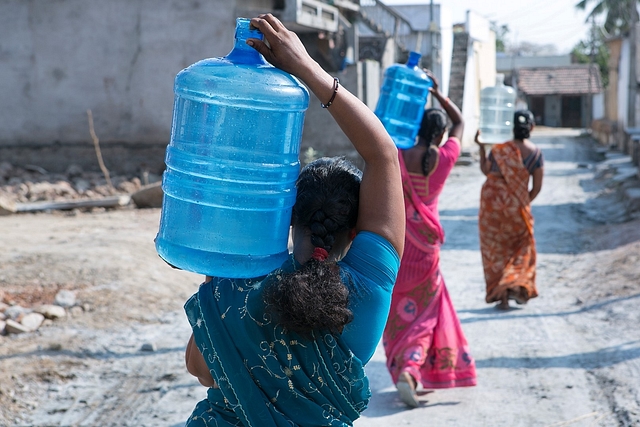
Dry Another Day: ITC Solves Potential Health Crisis In AP, Telangana By Setting Up Reverse Osmosis Water Plants
ITC has set up 127 Reverse Osmosis Water plants in villages which did not have proper drinking water source since 2014.
People no more spend sleepless nights worrying over water-supply and the hidden dangers associated with it.
Mastan Reddy, a farmer residing at Guruvareddy Palem in Andhra Pradesh’s Prakasam district will never forget last year’s Rama Navami in his life time. That day - 25 March 2018 - Kolkata-based ITC Ltd set up a reverse osmosis (RO) water plant in his village.
For the 46-year-old Reddy and his family, including two children, it was a big relief since they no longer had to trudge outside their village to fetch water for drinking and cooking purposes.
“Until last year, our village of 500 people had to depend on nearby places for water. That was not 100 per cent reliable,” he says.
Similarly, G Subramanyam and his family of Narasayapalem in Guntur district had to walk nearly 4 km to fetch water. “Two years ago, things changed after an RO water plant was set up in our village. Now all the 600-odd people in our village fetch water from the RO plant saving time and energy,” says Subramanyam.
Decades Of Persistent Water Scarcity
Guntur and Prakasam are the two most driest districts in Andhra Pradesh and possibly South India. These districts depend more on rains for their water needs than others. In the last couple of years, these districts have suffered one of the most prolonged periods of dryness. While in 2017 these districts faced one of the worst dry periods in the last few decades, in 2018, the situation turned worse.
Villagers had to trudge many miles to fetch water all year round. They depended on lakes, ponds, wells and tube wells for water. But the water they fetched was not clean or potable. Problems were acute during summer when these sources dried up. “The municipality used to supply water once in three days, that too one pot only,” says Subramanyam.
In addition, these water sources exposed the villages to the risk of water-borne diseases and diarrhea besides other health-related problems due to the presence of higher percentage of fluoride, arsenic, heavy metals and nitrates in the water.
Andhra Pradesh is one of the states in India where the number of people affected by fluorosis is the highest. At least 11 of the 13 districts in the state have been identified as places where the level of fluoride is higher than the permissible limit of 1.5 mg per litre. “We have had to face many problems due to lack of proper drinking water source. So, we approached ITC for a solution,” says Reddy.
The ITC Initiative To Resolve The Water Crisis
Sanjiv Rangrass, Divisional Chief Executive of ITC Agri Business Division, says that ITC began an initiative in 2014 to provide safe drinking water to the rural people. Today, 127 villages have been provided with RO plants, which also purify water of all its contaminants, benefiting nearly 1.5 lakh people.
The RO water plant is a community-based self-sustainable model involving village panchayats and the local communities. “We at the ITC only help setting up the plant and the RO system. Its maintenance and operations are taken care of by individuals,” says Rangrass.
On its part, the village panchayats provide land and electricity connections. The cost for setting each plant is Rs 7 lakh and the plant can provide 1,000 litres of clean, filtered water per hour.
The RO plants also provide employment, in that a person is employed to take care of the operations and maintenance. “A sum of Rs 3-5 is collected per 20-litre water can. The money is spent on salary for the employed person and maintenance of the unit,” an ITC official says.
“We get anywhere between 300 to 500 cans of water a day,” says Reddy, adding that the village would now probably require a bigger plant in view of its popularity, safety and wider usage.
“The operators are given the freedom to charge more, say Rs 10 or 15 per can, when water is required for functions like marriages. Villagers, too, have accepted this arrangement,” the official says.
A Project Study On Health Benefits Of RO Water Availability
A project study undertaken by a student of Professor Jayashankar Telangana State Agricultural University has come out with data on the health benefits of the RO plant that were set up by ITC. The study was done by a student Kranthi Kiran that included villages with and without the RO plants, in Andhra Pradesh and Telangana.
The study says that there have been zero incidences of water-borne diseases in villages where the RO plants have been set up. Earlier, people suffered frequently from diarrhea, viral hepatitis, dysentery and amoebiasis besides being affected by cholera once in a while, especially during the rains.
Additionally, the RO plants cut the distance travelled to fetch water from 4-5 km on an average to hardly a few hundred metres. The study said that earlier the village folk spent one to two hours to fetch water. Now, they hardly spend 15 minutes. The time saved is now being utilised for engaging themselves in farm work.
Fluoride, metal and other contamination were found to be zero with the parameters matching the Bureau of India Standards specifications. Also, the study found that the plant was fetching a revenue of Rs 15,000-20,000 every month.
In Conclusion
In Guruvareddy Palem and Narasayapalem, people no more spend sleepless nights worrying over water-supply and the hidden dangers associated with it. In addressing their concerns, ITC, under their corporate social responsibility banner, is taking good care of promoting rural health.